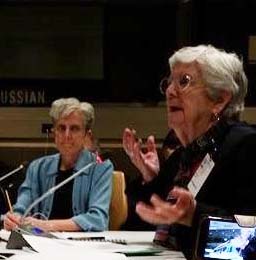Migration, Human Trafficking and the Eradication of Poverty were among a few of the many topics discussed at the UN during the 49th Commission on Population and Development, April 11-15, 2016. Both the Canadian and US Federations had representatives present to speak, advocate and listen from a global perspective on these important issues.
The week began at the UN by members of the group attending the opening of the 49th Commission on Population and Development, having as theme “Strengthening the demographic evidence base for the post-2015 development agenda.” Demographic data are fundamental to developing and assessing social and economic policies, including those focused on poverty reduction, and they provide an essential evidence base for national and local policymakers. The need for high-quality, timely, reliable and relevant demographic data has gained prominence in light of the recent adoption of the 2030 Agenda for Sustainable Development, in which population-related issues underpin many of the goals and targets.” Demographic evidence is essential to measure poverty and disease as well as to assess progress in reaching the Sustainable Development Goals.
On Tuesday morning the group met in the office of the UN-NGO, Justine Gitanjali Senapati, CSJ where they heard five presentations. The topics were varied: Human Trafficking (Winifred Doherty), Social Development (Daniel Perell), Eradication of Poverty (Cristina Diez Saguillo), Migration (Emeka Xris Obiezu, OSA) and Mining (Áine O’Connor, RSM, Ph.D).
The focus of the afternoon side event, sponsored by the Congregations of St. Joseph among others, was to critique the 2030 Agenda of the UN’s Sustainable Development Goals (SDGs) in the light of its ambitious slogan, “Leave No One Behind.” Each of the speakers focused on migrants and refugees, vulnerable populations who are often left behind in the formation of social policies. Their stories are not told because they are not represented at the tables where decision makers craft their policies. Even the topic of migration has no official place in the Commission on Population and Development.
Each of the six speakers spoke to a particular aspect of migration which includes human trafficking for labor and slave trade as well as the economic disparities in their home countries which cause people to leave. The theme of the afternoon session was “What can we do better to see people are counted so everyone can count!”
In giving his opening remarks, Archbishop Bernadito Auza, Permanent Observer of the Holy See, stated that, in face of global migration, we have to develop a culture of concern embedded in the Gospel rather than in the globalization of indifference. Sue Wilson, CSJ, Director of the Office of Systemic Change for the Canadian Federation of Sisters of St. Joseph spoke to the issue of labor trafficking. She noted that while workers have the right to report abuses, fear of repercussions often prevents them. Governments need to take human rights’ approaches to this issue. Consumers need to put pressure on companies whose supply chains depend on slave labor. Anthony Benedetto Pizzo, OSA spoke to the issue of detention centers, while Eileen McCann, CSJ, a lawyer for the undocumented in the US, spoke to the challenges of cases awaiting review by the Supreme Court and the unprecedented deportation of migrants by Homeland Security. The panel was ably moderated by Emeka Obiezu, OSA, UN Representative of the Curia Generalizia Agostiniana.

